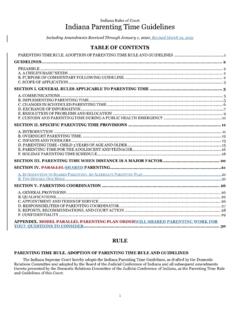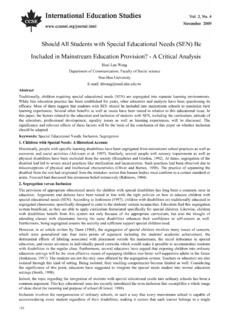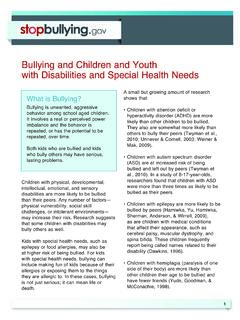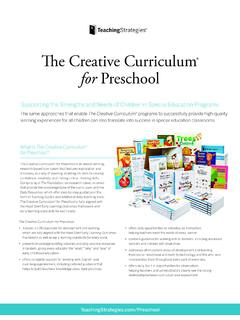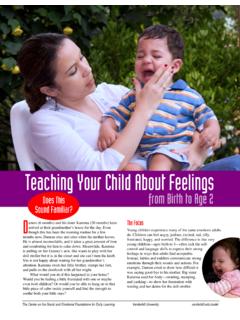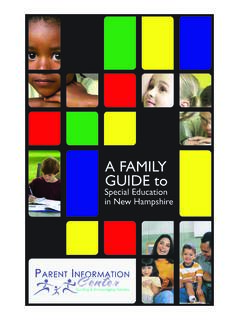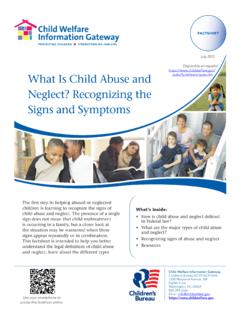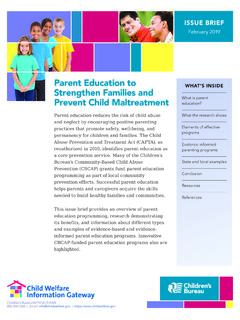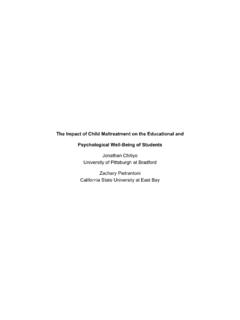Transcription of The Salamanca Statement and Framework for Action on ... - …
1 The Salamanca Statement and Framework for Action on special needs Education, the World Conference on special needs Education: Access and Quality, Salamanca , Spain, 7-10 June 1994. Main provisions relating to right to education Reaffirming the right to education of every individual, as enshrined in the 1948 Universal Declara- tion of Human Rights, and renewing the pledge made by the world community at the 1990. World Conference on Education for All to ensure that right for all regardless of individual differences, Recalling the several United Nations declarations culminating in the 1993 United Nations Stan- dard Rules on the Equalization of Opportunities for Persons with Disabilities, which urges States to ensure that the education of persons with disabilities is an integral part of the education system, Noting with satisfaction the increased involvement of governments, advocacy groups, community and parent groups, and in particular organizations of persons with disabilities.
2 In seeking to improve access to education for the majority of those with special needs still unreached; and recognizing as evidence of this involvement the active participation of high level representa- tives of numerous governments, specialized agencies and intergovernmental organizations in this World Conference, 1. We, the delegates of the World Conference on special needs Education representing ninety-two governments and twenty-five international organizations, assembled here in Salamanca , Spain, from 7-10 June 1994, hereby reaffirm our commitment to Education for All, recognizing the neces- sity and urgency of providing education for children, youth and adults with special educational needs within the regular education system, and further hereby endorse the Framework for Action on special needs Education, that governments and organizations may be guided by the spirit of its provisions and recommendations.
3 2. We believe and proclaim that: every child has a fundamental right to education, and must be given the opportunity to achieve and maintain an acceptable level of learning, those with special educational needs must have access to regular schools which should accommodate them within a child -centred pedagogy capable of meeting these needs , call upon all governments and urge them to: adopt as a matter of law or policy the principle of inclusive education, enrolling all children in regular schools, unless there are compelling reasons for doing otherwise, 4. We also call upon the international community.
4 In particular we call upon: governments with international cooperation programmes and international funding agencies, especially the sponsors of the World Conference on Education for All, the United Nations Educational, Scientific and Cultural Organization (UNESCO), the United Nations Children's Fund (UNICEF), United Nations Development Programme (UNDP), and the World Bank: to endorse the approach of inclusive schooling and to support the development of special needs education as an integral part of all education Framework for Action on special needs Education Introduction 1. This Framework for Action on special needs Education was adopted by the World Conference on special needs Education organized by the Government of Spain in co-operation with UNESCO.
5 And held in Salamanca from 7 to 10 June 1994. Its purpose is to inform policy and guide Action by governments, international organizations, national aid agencies, non-governmental organizations and other bodies in implementing the Salamanca Statement on Principles, Policy and Practice in special needs Education. The Framework draws extensively upon the national experience of the participating countries as well as upon resolutions, recommendations and publications of the United Nations system and other intergovernmental organizations, especially the Standard Rules on the Equalization of Opportunities for Persons with Disabilities.
6 It also takes account of the proposals, guidelines and recommendations arising from the five regional seminars held to prepare the World Conference. 2. The right of every child to an education is proclaimed in the Universal Declaration of Human Rights and was forcefully reaffirmed by the World Declaration on Education for All. Every person with a disability has a right to express their wishes with regard to their education, as far as this can be ascertained. Parents have an inherent right to be consulted on the form of education best suited to the needs , circumstances and aspirations of their children.
7 3. The guiding principle that informs this Framework is that schools should accommodate all children regardless of their physical, intellectual, social, emotional, linguistic or other conditions. I. New thinking in special needs education 6. The trend in social policy during the past two decades has been to promote integration and partici- pation and to combat exclusion. Inclusion and participation are essential to human dignity and to the enjoyment and exercise of human rights. Within the field of education, this is reflected in the development of strategies that seek to bring about a genuine equalization of opportunity.
8 11. Educational planning by governments should concentrate on education for all persons, in all regions of a country and in all economic conditions, through both public and private schools. 12. Because in the past relatively few children with disabilities have had access to education, especially in the developing regions of the world, there are millions of adults with disabilities who lack even the rudiments of a basic education. A concerted effort is thus required to teach literacy, numeracy and basic skills to persons with disabilities through adult education programmes. 13. It is particularly important to recognize that women have often been doubly disadvantaged, bias based on gender compounding the difficulties caused by their disabilities.
9 Women and men should have equal influence on the design of educational programmes and the same opportunities to ben- efit from them. special efforts should be made to encourage the participation of girls and women with disabilities in educational programmes. II. Guidelines for Action at the national level A. Policy and organization 15. Integrated education and community-based rehabilitation represent complementary and mutually supportive approaches to serving those with special needs . Both are based upon the principles of inclusion, integration and participation, and represent well-tested and cost-effective approaches to promoting equality of access for those with special educational needs as part of a nationwide strategy aimed at achieving education for all.
10 Countries are invited to consider the following actions concerning the policy and organization of their education systems. 16. Legislation should recognize the principle of equality of opportunity for children, youth and adults with disabilities in primary, secondary and tertiary education carried out, in so far as possible, in integrated settings. 20. special attention should be paid to the needs of children and youth with severe or multiple dis- abilities. They have the same rights as others in the community to the achievement of maximum independence as adults and should be educated to the best of their potential towards that end.
